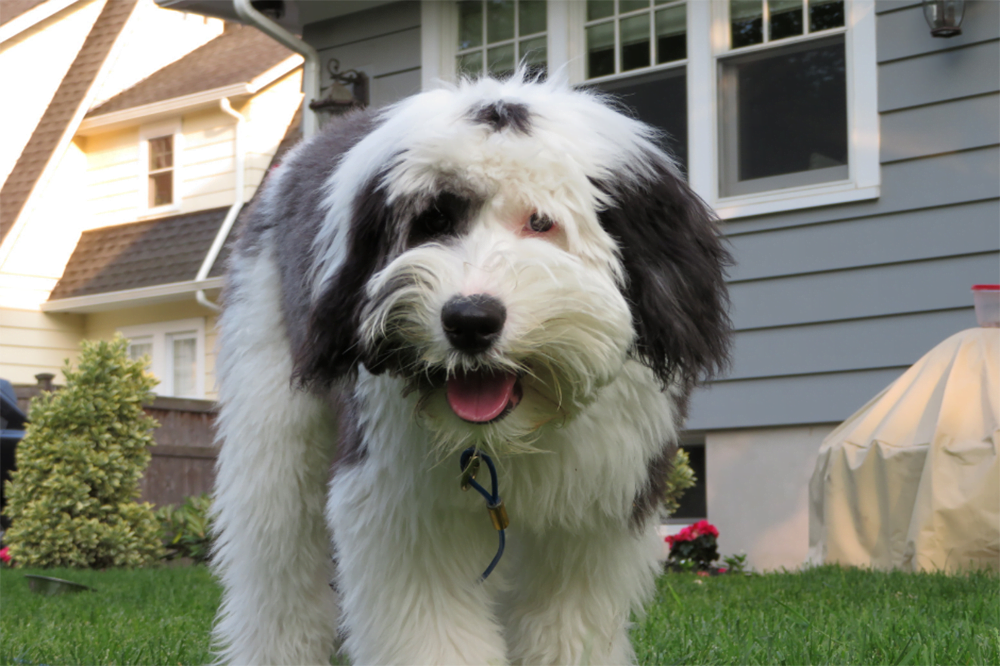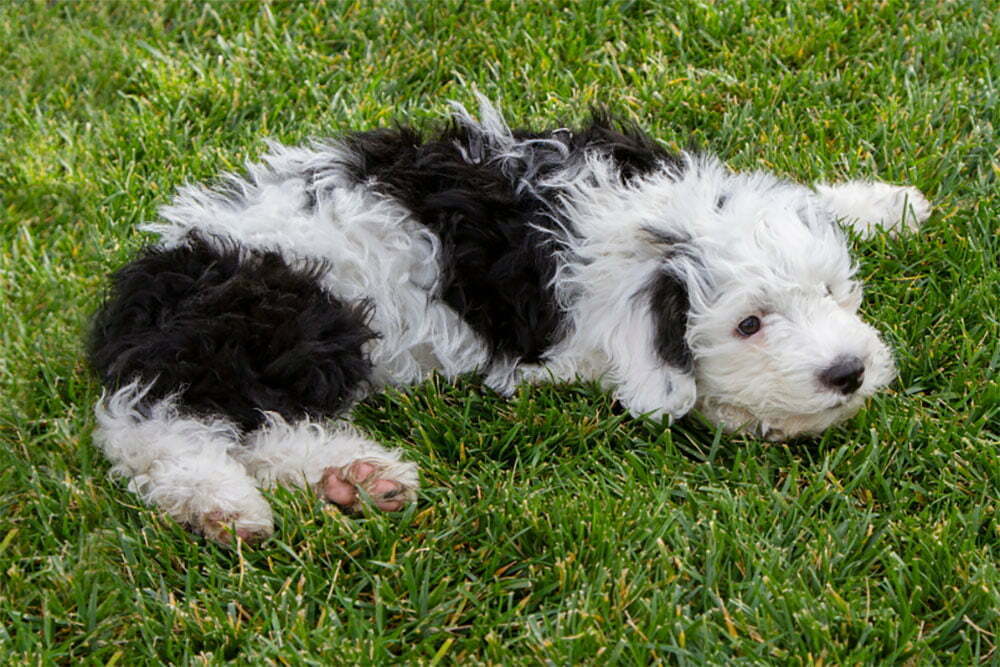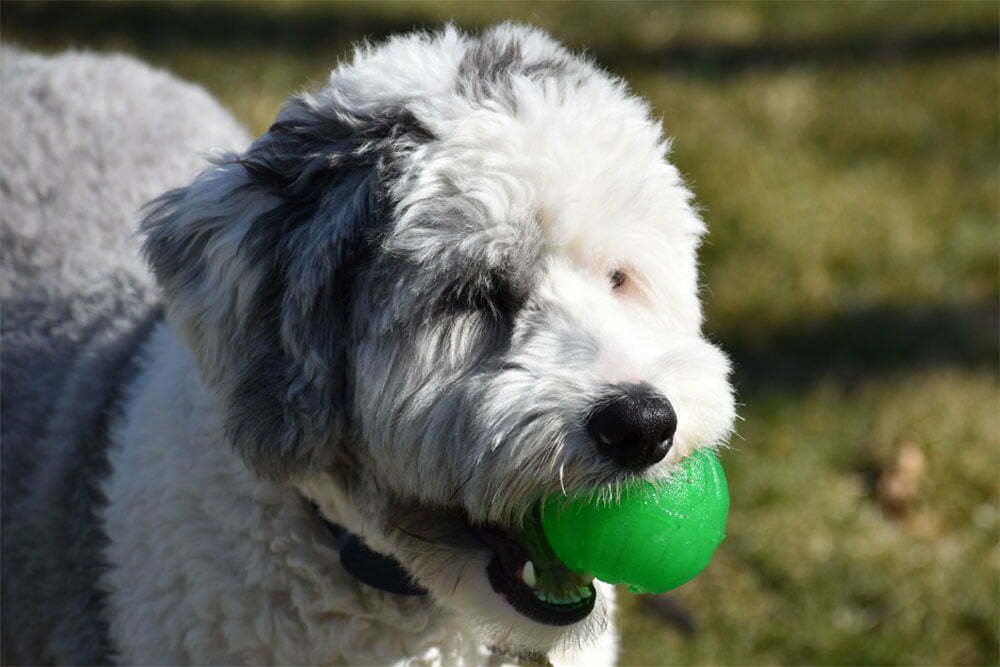If you are looking for a dog that is a mixed breed and has the ultimate cuteness factor, let us introduce you to the Sheepadoodle. This is such a fantastic breed of dog that is not only fantastic as a family pet but also a brilliant dog to own.
When you are choosing to purchase a breed of dog, it can be a difficult decision to decide on the best breed for you.

After all, there are so many breeds to choose from! When looking at a specific breed, you will need to ensure that the dog is the right fit for you and your family and that you are suitable owners for the dog too.
We have created this ultimate guide to help you figure out if Sheepadoodles are the breed for you. We will be focusing on all aspects of this breed, from grooming to temperament.
Key Facts
While the Sheepadoodle is not the most popular type of doodle, it has been a hybrid breed since the 1960s. As they are a gentle and loving breed, it is easy to see why they are a popular choice of dog.
Sheepadoodles are a mix between an Old English Sheepdog and a poodle. Depending on the breeder’s preference, they can be mixed with any size poodle. You may be familiar with this breed being called names such as Sheep-a-poo, Sheepdoodle, and Sheeppoo too.
When looking at other types of doodles, the Sheepadoodle is quite similar to the Bernedoodle in both size and temperament, but they are more docile and trainable on the whole.
Average lifespan
Given that a Sheepadoodle is a large breed of dog, they have a slightly shorter lifespan compared to smaller breeds. While it can vary depending on the individual dog, on average, the majority of Sheepadoodles will live for around 10-13 years but can live up to 15 years.
Minimum exercise (per day)
Considering that this breed is half Old English Sheepdog, you will need to be prepared for the amount of exercise it requires. They are a fairly active breed; as an owner, you will need to cater to this.
They will need to have daily walks, which should last for around 60 minutes a day. In addition to this, they enjoy playing, running, and mental stimulation too.
Coat length
Sheepadoodles will typically have a medium-length coat that is wooly and curly. While it can grow out, it will be around a few inches long, though some owners will cut back the coat length in the summer months.
Minimum cost (per month)
Sheepadoodles are fairly low maintenance when it comes to their monthly costs. The main things you will need to purchase are food, and toys to keep them occupied. You should also consider grooming costs, insurance, and treats. You will be looking at around $80 – $100 per month.
Appearance
Sheepadoodles have a beautiful appearance. They have a fluffy woolen coat and look similar to a large teddy bear. They will typically look like a mixture of both an Old English Sheepdog and a Poodle, though they can look more like one breed than the other.
Furthermore, they typically have white coats with black patches, which often turn gray when they are fully grown. While they can also be white and tan, this is fairly rare for a Sheepadoodle.
Size
A Sheepadoodle is a large breed of dog but can fall into the medium-sized category if the Old English Sheepdog is bred with a smaller poodle. Their height and weight will vary depending on a number of different factors.
Average Height
When looking at the height of a Sheepadoodle, this will vary given that it is a hybrid breed. The height of the dog will be based on the size of the parents and genetics. As a rough guide, a Sheepadoodle will typically be anywhere from 18 to 27 inches when they are bred using a standard poodle.
If a miniature or toy poodle is bred with the Old English Sheepdog, the height will be smaller than this. To get a more accurate idea of the height, it is best to assess the height of the parents.
Average Weight
Similarly to the height of a Sheepadoodle, the weight can vary due to a number of factors too. As with the height, you will need to take into consideration the weight of both parents. This will allow you to have a better idea of what the size of the puppy will be.
When a standard poodle is used, the puppies will typically weigh around 65-85 pounds, which is reasonably heavy. When smaller poodles are bred, the weight will be lighter.
In addition to this, medical factors can affect the weight of the dog, as can overfeeding and a lack of exercise, which is something you will need to keep a close eye on.
Temperament
Sheepadoodles have a fantastic temperament. They are loving dogs and will make fantastic family pets. They are well-natured, playful, and great around other animals and children. Furthermore, they are not typically aggressive dogs and are approachable.
Apartment living
Given that Sheepadoodles tend to be larger breeds of dogs, they are not recommended for apartment living. This is because they need the space to be able to play and relax comfortably.
In addition to this, they benefit from having access to the outdoors and an enclosed yard, where they can use their excess energy. While it is possible to keep them in an apartment, they are better suited to a larger apartment and owners that can take them outside regularly.
Good for novice owners
What is great about Sheepadoodles is that they are a good option for novice dog owners. They are not too difficult to handle or train and are quick to please. They respond well to commands and are not overpowering or too strong-willed.
Given that theft makes great family pets, they are a great option to consider if you have children or other pets. They have an easy-going nature and are not too wired on the whole.
They also love being in a family environment and are loyal to their owners, which makes them a great option as first pets.
Sensitivity level
This breed is not overly sensitive, given their laid-back and well-natured personalities. However, they will still need to be trained correctly to help with issues such as separation anxiety.
Tolerated being alone
Sheepadoodles can tolerate being left alone, but given how much they love being around their owners, they are known to experience separation anxiety. As a result of this, you will need to train your dog to ensure they are comfortable being left for a few hours alone.

It is not recommended to leave this breed for longer than four hours alone, and you will need to ensure that they have enough mental stimulation to prevent destruction too.
Tolerates Cold Weather
A Sheepadoodle has a thick and fluffy coat. As a result they tolerate the cold weather well.
Tolerates Hot Weather
While this breed can tolerate warm weather, care needs to be taken. This is because they can quickly overheat, given their thicket coat. Their coats can be clipped shorter in the warmer months. You will also need to ensure that they do not burn, given their lighter-colored fur.
Affectionate With Family
This breed is very affectionate with their family and is a perfect dog to have as a family pet. They are relaxed and very affectionate.
If you are looking to have an emotional connection with your dog, a Sheepadoodle is a great option to consider. While every individual dog is different, they are known to enjoy cuddles and scratches a lot.
Kid-Friendly
Given their well-natured personality, they are child-friendly. They are gentle and tend to be quite patient with children.
Even so, you will want to ensure that you are teaching your child how to interact with the dog in the correct manner. You will want to introduce the child and the dog slowly and not leave the child unattended with the dog.
Dog Friendly
Sheepadoodles are dog-friendly and tend to get on well with all animals. Even so, you should always introduce the dogs slowly to each other and monitor the situation closely.
Friendly Toward Strangers
This is an accepting breed, and Sheepadoodles are good with strangers.
Health And Grooming
When purchasing a Sheepadoodle, you will need to ensure that you are aware of any potential health issues, and their grooming needs. As they are a mixed breed, they do not tend to have as many health problems, but these issues can still be present.
Shedding
Given their fur, they do not shed very much. While they will need to be brushed regularly, their fur is fairly easy to maintain. Their fur is often seen as hypoallergenic.
Drooling
Sheepadoodles are not known to drool.
Grooming
While the fur of a poodle cross is often daunting, it is actually fairly easy to manage and stay on top of. While this breed will typically have a wavy and curly coat, some may have straighter fur that resembles an Old English Sheepdog.
Regular brushing and a bath every six weeks or so make the fur easy to manage. Some people will even choose to have the fur clipped back to help keep on top of it. If you want the fur styled or are unsure or want to have the fur professionally groomed, you can opt to visit a professional groomer.
General Health
As we have already touched upon, the general health of a mixed breed tends to be better than a pedigree dog. This is due to there being fewer genetic problems on the whole. However, they can still be prone to issues that you will need to keep in mind.
In addition, you will need to keep on top of their general health, which includes regular flea and worming treatments, vet health checks, and brushing their teeth.
You will also want to ensure that you are choosing the correct breeder. You need to do thorough research to ensure the breeder is reputable. This will help to prevent health issues with the puppies. However, this is still not always a guarantee.
When visiting a breeder, always ensure to ask for both parents’ health certificates, along with the family history. In addition to this, hip scoring and the parent’s general health should also be good.
Common health problems
When looking at health problems, there are some issues that Sheepadoodle have been known to suffer from:
Hip Dysplasia — Hip dysplasia is a common issue that is associated with Old English Sheepdogs. This is why it is important to ensure that both parents have good hip scores. This can help to prevent these issues in the litter of puppies.
Addison’s Disease — This is a serious disease that can affect dogs, and it causes issues such as gastroenteritis and poor appetite. It is typically linked to the adrenal glands. It is a serious illness that requires medication and treatment.
Joint Issues – In addition to hip dysplasia, Sheepadoodles can suffer from general joint issues. This is fairly common in larger dogs, especially as they age.
In addition to these issues, Sheepadoodles can suffer from bloat, which is uncomfortable. To help alleviate this, the correct diet should be given. The correct diet can also help to prevent skin issues too.
Potential for weight gain
As Sheepadoodles can be prone to obesity, you will need to ensure that you regularly exercise your dog and do not feed too many treats.
Obesity can lead to many other health problems, such as joint issues and diabetes, which can be avoided when they are fed the correct diet and treats in moderation.
Trainability
Given the two breeds used to create the Sheepadoodle, this is a fairly easy breed to train. They enjoy the mental stimulation of training and will respond well to it.

Being eager to please, they are not overly stubborn and will pick up commands quickly. They enjoy positive reinforcement and should be trained from a young age.
However, you will need to put the time and effort required into training this breed.
Easy to train
As discussed, this is an easy breed of dog to train. They respond well to training, which is fairly easy to do, even for those new to owning dogs.
Intelligence
They are a highly intelligent breed of dog.
Potential to bite
It is important to remember that all dogs have the potential to bite. However, given that Sheepadoodles are not an aggressive breed by nature, they are not prone to biting and are very loving and patient dogs.
Tendency to bark or howl
This breed is not known for being overly noisy when it comes to barking and growling, which should not be too much of a problem. If it is, it is something that can be worked on through training.
History
As we have already touched upon, Sheepadoodles can be dated back to the 1960s, though they were not known by the Sheepadoodle name until fairly recently. They were bred as an experiment in the US Army as military dogs. But, it was not until the early 1990s that the doodle name became popular.
They are bred because both breeds have great characteristics, and mixed-breed dogs tend to have the best traits and genetics of both breeds. The Sheepadoodle is great at herding and has the intelligence of a poodle.
Being a mixed breed, they are more commonly known as hybrid or designer dogs. They are sought after because they have “hypoallergenic” fur and have a great temperament.
While they originated in the USA, they are becoming increasingly popular across the globe.
Costs
The cost of a Sheepadoodle is quite high. While they are becoming a more popular breed, they are still a fairly rare breed in the grand scheme of things. While there are many breeders, they are not in abundance.
The cost of a Sheepadoodle will vary depending on where you are purchasing the dog in the USA. In addition to this, popular breeders can also charge more money too.
On average, a Sheepadoodle will cost anywhere from $1000 to $3000. In addition, you will need to consider neutering costs, insurance, initial costs, food, and general healthcare.
Fun Facts
Meryl Davis and Fedor Andreev, who are Olympic figure skaters, own a Sheepadoodle called Bilbo.
When Sheepadoodles are puppies, they can consume up to 2100 per day because they are so active. That’s a lot of food!
As the Old English Sheepdog is a herding dog, you may also notice this trait in your Sheepadoodle! Do not be surprised if you find that your dog tries to herd you and your family into the same room from time to time!
Frequently Asked Questions
What is a Sheepadoodle?
The Sheepadoodle is a mixed breed of dog that is a cross between an Old English Sheepdog and a poodle. They have been a hybrid breed since the 1960s and are popular for their gentle and loving temperament.
What are the different names for a Sheepadoodle?
A Sheepadoodle is also known as a Sheep-a-poo, Sheepdoodle, and Sheeppoo.
How long does a Sheepadoodle typically live?
The average lifespan of a Sheepadoodle is 10-13 years but can live up to 15 years.
How much exercise does a Sheepadoodle need?
Sheepadoodles are a fairly active breed and need daily walks for around 60 minutes and enjoy playing, running, and mental stimulation.
What is the coat length of a Sheepadoodle?
A Sheepadoodle has a medium-length, wooly, and curly coat that can grow out to a few inches long but may be trimmed in the summer.
How much does it cost to own a Sheepadoodle per month?
On average, the monthly cost of owning a Sheepadoodle is $80-$100, including food, toys, grooming, insurance, and treats.
How big is a Sheepadoodle?
The size of a Sheepadoodle can vary and depends on the size of the parents and genetics. On average, a Sheepadoodle bred with a standard poodle will be 18 to 27 inches tall and weigh 65-85 pounds.
What is the temperament of a Sheepadoodle?
Sheepadoodles are loving, well-natured, playful, great around other animals and children, and approachable.
Can a Sheepadoodle live in an apartment?
Sheepadoodles are not recommended for apartment living as they are large breeds and need space to play and relax. They benefit from access to the outdoors and an enclosed yard.
